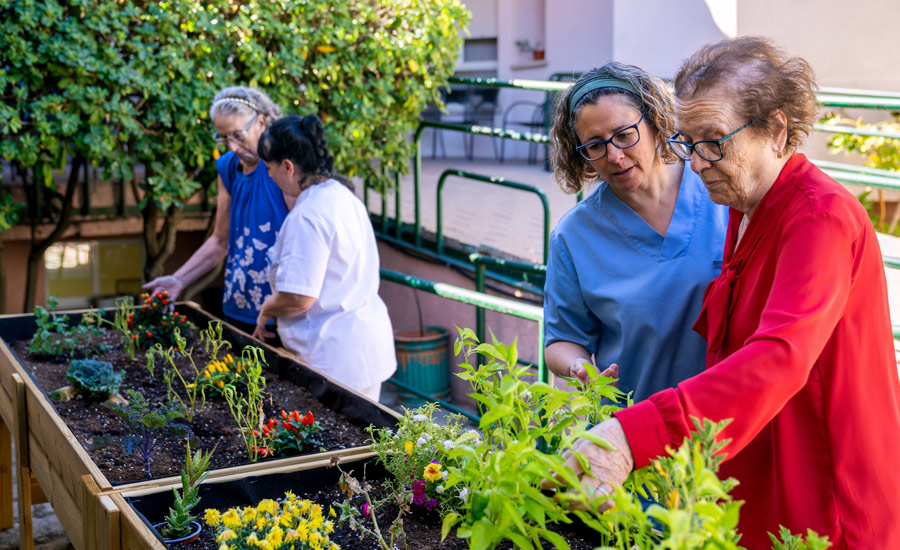How Care Homes Plan Activities for Residents With Dementia

When a loved one moves into a care home, families often ask what life will be like. Activities are a big part of life in a care home, but for residents living with dementia, it’s not just about keeping busy. What’s planned needs to make sense for where they are in their condition and how they’re feeling at the time.
Discover how care homes plan activities with dementia in mind and how they adapt to different stages and changing needs.
How are Activities Adapted for Different Stages of Dementia?
Care home staff will adapt activities as dementia progresses. For example:
- Early stage – Group conversations, light games and gentle exercise
- Middle stage – Music, guided tasks and sensory sessions
- Later stage – Quiet spaces, familiar sounds and hand massage
Staff will change up activities based on how each resident is doing day to day.
What Care Homes Consider Before Planning Activities
Here’s what care homes take into account before anything goes on the schedule:
Stage of dementia
Whether your loved one is in the early, middle or later stages, this guides the level of support they’ll need. Some can still follow conversations and group games, while others may need quiet, one-to-one sessions.
Physical health and energy levels
If a resident tires easily, struggles with mobility or has other health conditions, care home activities may need to be shorter or more relaxed. Timing matters too, because some residents manage better earlier in the day.
Cognitive changes
Memory loss, reduced focus and difficulty following instructions shape what’s appropriate. Activities that rely heavily on words or quick thinking are swapped for something more hands-on or sensory-based.
What they have always enjoyed
Personal history plays a significant role. If your relative liked music, gardening or cooking, these familiar themes can be built into activities. It must feel familiar and reassuring.
How they respond in the moment
Even with a plan, staff watch closely. If a resident seems anxious, distracted or not in the mood, the session might be paused, simplified or changed altogether.
Input from families and daily care teams
Family insight helps shape the initial plan. After that, it’s the staff’s observation that keeps things on track – picking up on patterns, noting changes and adjusting what’s offered every day.
What Activities Look Like at Different Stages of Dementia
Early Stage
In the early stage, your loved one may still enjoy a good chat, follow group conversations and take part in things that feel purposeful. They might get involved with light physical movement, discussion groups, simple games or tasks that follow a sequence, like table setting or baking. Activities for the early stages of dementia should support confidence, memory and social connection, without being too demanding.
Middle Stage
As dementia progresses, attention spans and communication can become more limited. At this point, activities often focus on routine, reassurance and familiar themes. Think smaller groups, shorter sessions and practical support from staff throughout. Listening to music, painting, sorting tasks or looking through memory prompts will work well here, especially when the setting is calm and predictable.
Later Stage
In the later stages, the goal shifts toward comfort and emotional support. Activities involve gentle interaction, quiet background music, soft textures or holding a familiar item or stroking a pet. The pace is slower, and your loved one may not actively engage. However, the experience of being part of something can still be meaningful.
When Plans Need to Change
Even with the best planning, not every day goes to plan. Your loved one might have slept poorly, feel unwell or not be in the mood. That’s completely normal and it’s why flexibility matters just as much as preparation.
Trained staff get to know each resident well enough to spot when something needs to shift. If an activity feels too fast, too noisy or too much, they’ll adjust it on the spot or offer a quieter alternative. That might mean stepping away from a group, doing something one-to-one or just having a bit of space.
Sometimes it’s a small change that makes the difference, like changing the music, moving to a different room or switching a task for something more familiar. Good activity planning includes responding to the moment.
Why the Right Activity at the Right Time Makes a Difference
When an activity is planned carefully and adjusted when needed, it can shape how your loved one with dementia feels for the rest of the day. A calm session in the morning might help with their focus or reduce anxiety later on. Something familiar in the afternoon can help ease restlessness or confusion.
These sessions often do more than they seem on the surface. A short moment of eye contact, staying a little longer in the room or responding to a song can be a sign that something has landed in the right way. Those small shifts make your loved one feel more settled and present, showing that the activity was worth it.
When Activities for Dementia Really Work
Planning activities for residents with dementia isn’t always straightforward. It takes time, consistency and a good understanding of what feels manageable for your loved one on that particular day.
When activities are handled with care, they can make a quiet but meaningful difference, helping your loved one feel more settled, less anxious and more connected to the world around them, even in small ways. That’s where good dementia care really shows.
Ready to explore...
